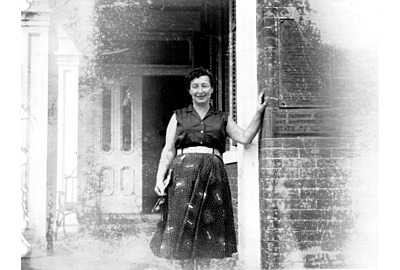On 8 March, we once again celebrate "International Women's Day", and with it the great women in our lives as well as around the world. We would like to take this special day as an opportunity to shine the spotlight once again on four special women from GOJO's history. Because without them, the formation and development of GOJO would definitely have been different.
Goldie Lippman - the woman with the vision
GOJO was founded in March 1946, shortly after the Second World War. It was a time when women were entering the workforce and taking on roles traditionally occupied by men before the war. GOJO's co-founder, Goldie Lippman, was one of those women. She worked as a supervisor in a rubber factory in Akron, Ohio, then the "rubber capital" of the world. Goldie and her female colleagues discovered how difficult it was to clean their hands after a long day's work in the factory. The men who had worked in the rubber factories before the war dipped their hands in chemicals like paraffin and benzene at the end of their shifts to remove graphite and carbon black. These harsh chemicals took a heavy toll on the workers' hands and the women were simply not willing to use them. So, Goldie and her husband Jerry started looking for a better solution.
Foresight and financial skills
Jerry worked with a chemist at Kent State University to develop the first-ever hand cleaner that rinsed off in one step, effectively removing difficult soils while being safe for the skin. Soon Goldie and Jerry were building a growing company: GOJO. The couple first worked in the basement of their parents' house and then moved into a converted petrol station building. Goldie managed the operations of the young company, including pricing, purchasing and finance, while Jerry was responsible for sales, production and product improvements. Goldie demonstrated foresight by putting aside profits from successful years to help GOJO through the leaner years. Her approach of planning for multiple scenarios and building the company for the long term was crucial to the success of the 75-year-old family business in good times and bad.
The GOJO culture, shaped by women's hands
Long before one could speak of equal opportunities in the workplace, GOJO's value of "putting people first" gave women in particular a great opportunity to make a meaningful contribution to the company and to develop personally. The very first GOJO employee after Goldie and Jerry was Eleanor Morris. Eleanor mixed batches of GOJO hand cleaners while Jerry continued to work in sales and Goldie kept a firm hand on the accounts.
In the 1950s, two other women, Wave Swigert and Nancy Foose, ran the GOJO factory, and pioneered female leadership in the supply chain. Wave managed dispenser production and Nancy's team manufactured soap containers. Both Wave and Nancy had decades-long careers at GOJO. Wave even retired after about 50 years of service - that's called commitment!
These four women - Goldie, Eleanor, Wave and Nancy - played crucial roles in establishing GOJO as a great company in the early years of the family business. With their dedication and drive, they paved the way for many women in leadership positions at GOJO.













